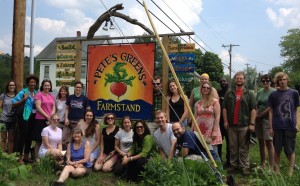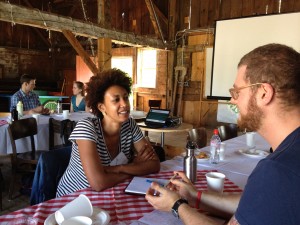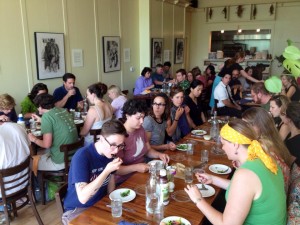By Vic Izzo
 Whether it is a parking lot chock full of out-of-staters waiting for their case of Heady Topper beer or a meandering New Englander traveling to the picturesque town of Grafton for a taste of 4 year-old cheddar, it is clear that the flavors of Vermont are garnering quite a bit of attention these days. For a state boasting the second smallest population in the United States, it is quite astonishing that Vermont would emerge as a leader in the burgeoning national food culture.
Whether it is a parking lot chock full of out-of-staters waiting for their case of Heady Topper beer or a meandering New Englander traveling to the picturesque town of Grafton for a taste of 4 year-old cheddar, it is clear that the flavors of Vermont are garnering quite a bit of attention these days. For a state boasting the second smallest population in the United States, it is quite astonishing that Vermont would emerge as a leader in the burgeoning national food culture.
Or is it?
Despite its small size, Vermont has played a historically large role in shaping both the agricultural and culinary landscapes of the nation. Of course, many are well aware of the rich dairy tradition here in the land of Cabot and Ben & Jerry’s, but Vermont has been (and continues to be) more than a one trick…er…calf. For instance, previous to the establishment of large scale wheat production in the Midwest, Addison County was the bread basket of New England. In fact, during the mid-1800s, the premier plant breeder in the nation, Dr. Cyrus Pringle, resided in Vermont and conducted his research at the University of Vermont. And for those who fancy hoppy Vermont beers, it may be surprising to hear that Vermont was once the second leading producer of hops in the USA (a tradition being revitalized through the UVM Extension Hops Project).
 Today the tradition of Vermont food system innovation continues and is again gaining national recognition. Pioneering leaders such as organic seed producer Tom Stearns of High Mowing Seeds and the Intervale Community Farm Cooperative led by Andy Jones in Burlington are demonstrating to the nation what is possible outside the bounds of corporate agriculture. For even more inspiration from the Vermont food moment, one just needs to pick up the book The Town That Food Saved, which details the renaissance of food culture in the small rural town of Hardwick, VT.
Today the tradition of Vermont food system innovation continues and is again gaining national recognition. Pioneering leaders such as organic seed producer Tom Stearns of High Mowing Seeds and the Intervale Community Farm Cooperative led by Andy Jones in Burlington are demonstrating to the nation what is possible outside the bounds of corporate agriculture. For even more inspiration from the Vermont food moment, one just needs to pick up the book The Town That Food Saved, which details the renaissance of food culture in the small rural town of Hardwick, VT.
Bottom line…Vermont continues to lead with the plow and the fork.
In the tradition of Cyrus Pringle and the many food system leaders haling from Vermont, the University of Vermont will be offering its third annual Breakthrough Leaders Course in Sustainable Food Systems this June. The intent of the course is to provide leadership training for students, professionals, and aspiring innovators looking to “breakthrough” the established boundaries of the current food system. During the program, students will obtain a working knowledge of systems theory and develop practical skills for implementing change at various scales within a food system. Participants will also have the opportunity to engage local Vermont leaders, activists, and scholars (e.g. South End Kitchen, ArtsRiot, Bread and Butter Farm, Hunger Free Vermont, and more) to identify common recipes for sustainable change. The course will be led by UVM Extension Professor Vern Grubinger, Continuing Education Dean Cynthia Belliveau, and myself, with contributions from a diverse array of presenters and instructors.
 The course is a professional certificate program, but can be taken for graduate credit as well within the Master’s in Sustainable Food Systems program at UVM. For the certificate program, an online portion of the course will run from June 2-13, followed by an on-campus program June 13-20. Master’s students will participate in an extended online section following the residential program.
The course is a professional certificate program, but can be taken for graduate credit as well within the Master’s in Sustainable Food Systems program at UVM. For the certificate program, an online portion of the course will run from June 2-13, followed by an on-campus program June 13-20. Master’s students will participate in an extended online section following the residential program.
The annual UVM Food Systems Summit will also run synchronously with the residential portion of the Breakthrough Leaders course (June 17-18). The summit brings scholars and innovators from throughout the global food system together to present and discuss viable solutions for the current issues facing our current system. Participation in the summit is included as part of the Breakthrough Leaders course.
As a part of the instructional team, I am again excited to engage with a new group of inspiring food system leaders. While the knowledge and experiences attained during the course are incredibly valuable, the emerging network of Breakthrough Leaders alumni is quickly becoming an essential resource for both instructors and participants. After all, sustainable change cannot be achieved in a vacuum. It requires the efficient coordination and collaboration among all of the parts of the system. We hope that the Breakthrough Leaders course continues to facilitate these important (and necessary) collaborations.
Vic Izzo is an evolutionary ecologist, herpetologist, entomologist and life-long educator. He currently teaches at Johnson State College and hosts a food system radio program, The Great Scape, Sundays at 8pm on 105.9 The Radiator in Burlington, VT.










